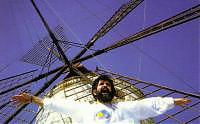Saturday, December 23, 2006
continua la dolcezza della vita

quello che non siamo/smetteremo di essere
non-letture se ne va off-line per un po'.
vi lascio a non-leggere gli archivi (qualunque cosa possa voler dire) i testi, i link,
l'opera in-tessuta assieme in questi mesi.
poi vi aspetto a verona il 20 gennaio: anche per me incipit vita nova
intanto una poesia [dedicata innanzitutto a marco]:
Correvo
quei campi
di lavanda
E ti premevo
piu’ forte
Salivi
quelle colline
viola
piu’ dentro
Scomparivamo
assieme
nel Mistral provenzale
Ricomparendo
nel profumo
di lenzuola
asciugate al sole
Nudi
ricomponevamo
i nostri corpi
nella luce opaca
tartito da ---gallizio
al tempo dello switch
permalink
Wednesday, December 20, 2006
the tonto is back!

unfortunately, the truth is not!
Lettera al direttore
de La Stampa
Giulio Anselmi
Firenze 20/12/06
Oggetto / articolo di Mattia Feltri apparso su La Stampa del 19/12/06
Caro Direttore,
mi chiamo Aldo Ricci e sono l’autore di un romanzo-saggio assai controverso titolato il Tonto (Germano, Padova, 2001), a suo tempo pre-recensito da Marco Travaglio su l’Espresso, con una intervista che mi valse una querela di Adriano Sofri, estesa a Travaglio nonché a lei, allora direttore del settimanale in questione. Querela che dopo un anno d’attesa, priva com’era di appigli legali di sorta, venne ritirata dallo stesso Sofri... (continua qui)
tartito da ---gallizio
nell'era shamanica del post-saman
permalink
non-letture a'la de biase

che anche luca stia convergendo (o divergendo?) verso la non-lettura?
Mi sono accorto che forse c'è un senso nel fatto che da qualche tempo uso degli occhiali diversi per leggere. Sono meno forti di quelli che uso in altre circostanze. Come se la correzione della quale ho bisogno per leggere sia meno rilevante di quella della quale ho bisogno per il resto della vita. Se l'evoluzione dei miei difetti oculistici continuerà nello stesso modo, i miei occhi ritorneranno al loro equilibrio naturale, ma solo quando leggo...
tartito da ---gallizio
all'epoca defocalizzata e lenta delle lenti
permalink
Monday, December 18, 2006
have an inkling?

According to Chris Anderson, one of the driving forces behind the Long Tail is democratization of the tools of production. For lovers of video, it is possible to use cheap tools to make what was once the domain of the studios. Print on demand does the same for books. Ebay makes anyone a retail shop front. In the Long Tail thesis, when you have democratization of production, you get markets with a lot of choice - an explosion of niche products. When you add in zero or low cost distribution and declining information asymmetries, all those niches sell.
What are Prosper and Zopa doing? Democratising the production of loans: now anyone can be a bank! Selling the niche: chances are the loan terms that best suit you are going to be available where there are thousands of consumer created loan products. Zero cost distribution: the loan is matched and fulfilled automatically.
Zopa and Prosper are long tail business.
I wonder how many banks actually know of the existence of these businesses though?
Or if they know them, have an inkling of what it might mean for them?
Banks have always had a special (and very profitable) position in society because of their unique relationship with the economy, their ability to manage risk collectively, and most of all, their leverage of information asymmetries to make them the best place to match the needs of investors and borrowers. For the unsecured personal loan (an admittedly simple banking product) the long tail nature of Zopa and Prosper completely unhinges the value proposition of traditional banking.
It is only a matter of time before clever people find a way to make a long tail business work for a mortgage. And that, frankly, has the potential to do some very nasty things indeed to the results of incumbents in the banking industry.
The beauty of this model is that it competes with the very things that Banks cannot replicate:
* its cheap(er) for the borrower, and higher rate for the lender
* a lender who cares, cares enough to seek out the borrower, and understand the borrowers personal story
* processing costs are eliminated - replaced by people who care
I am trying to think of how Banks can compete. This is the ultimate in disintermediation. For now, Banks are watching and privately hoping it won’t work, but I am afraid that is unlikely. It may evolve but it will work. We know that because eBay had the same questions asked in 1999 - no-one is asking now.
via bankwatch
tarted by ---gallizio
at the peers-brosnan time
permalink
costlessly rendering

second life
the hard questions here are, What could the economy be, in a world where every physical object can be costlessly rendered in whatever quantities desired? And what should it be? Whatever the answer may be, it is apparent that nobody is waiting for them.
tarted by ---gallizio
in the cut and past copyboted era
permalink
Saturday, December 09, 2006
rifarsi una vita (non-rival is quite different than non-viral)

shade-how
[the rule is simple: inflate and destroy]
The Economy of Second Life is demonstrating that, for media and knowledge products, the model of scarcity and control of property through control of access is breaking. The nature of the bit medium, and the file-copying nature of computers in general, turns digitized media content, software, and knowledge products are fundamentally non-rival, or even anti-rival goods.
(continua qui)
tarted by ---gallizio
in the everdubbing era
permalink
Saturday, December 02, 2006
come nessuno aveva mai corso

Correva, sempre piu' veloce, piu' sciolto, col cuore che bussava, ma dall'esterno verso l'interno, come se smaniasse di riconquistare la sua sede. Correva come non aveva mai corso, come nessuno aveva mai corso, e le creste delle colline dirimpetto, annerite e sbavate dal diluvio, balenavano come vivo acciaio ai suoi occhi sgranati e semiciechi. Correva, e gli spari e gli urli scemavano, annegavano in un immenso, invalicabile stagno fra lui e i nemici.
Correva ancora, ma senza contatto con la terra, corpo, movimenti, respiro, fatica vanificati. Poi, mentre ancora correva, in posti nuovi e irriconoscibili dalla sua vista svanita, la mente riprese a funzionargli. Ma i pensieri venivano dal di fuori, lo colpivano in fronte come ciottoli scagliati da una fionda. «Sono vivo, Fulvia. Sono solo, Fulvia, a momenti mi ammazzi».
Non finiva di correre. La terra saliva sensibilmente, ma a lui sembrava di correre in piano, un piano asciutto, elastico, invitante.
tartito da ---gallizio
al tempo promisso eiiuro dell'infinitivo futuro
permalink
il potere e' un gioco

luoghi non-luoghi della scritta'
piu' scritta'
Nella lotta contro il potere non occorre l'ebbrezza ne' la follia; non e' la festa il nemico del potere. Bisogna sapere che cos'e' il potere. Il potere e' un gioco, ma per smascherare il baro occorre un altro gioco, condotto con non minore perfidia e con lo stesso autocontrollo. L'antipotere deve essere altrettanto spietato e lucido del potere. Ma non deve semplicemente contestarne la legittimita'. Deve dichiarare inaccettabile il potere.
(...) La macchinazione contro il potere richiede la sua approfondita conoscenza. Il potere e' una fabbrica da smontare, un complesso sipario al di la' del quale sta un fantasma. Pazienza da meccanici, dunque, che bisogna imparare, infliggersi, senza mai perdere di vista che si tratta solo di un espediente, poiche' la verita' (intesa come opposto della realta') sta, appunto, altrove - cioe' in nessun luogo.
francesco saba sardi, dominio
tartito da ---gallizio
all'epoca fantasmatica della maschera follis
permalink

